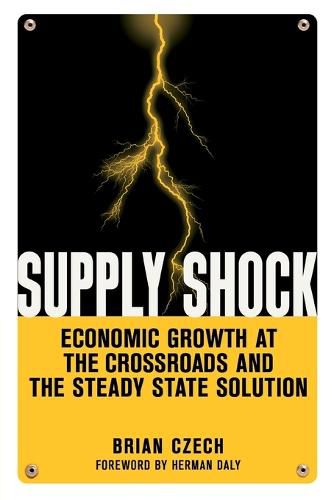Readings Newsletter
Become a Readings Member to make your shopping experience even easier.
Sign in or sign up for free!
You’re not far away from qualifying for FREE standard shipping within Australia
You’ve qualified for FREE standard shipping within Australia
The cart is loading…






This title is printed to order. This book may have been self-published. If so, we cannot guarantee the quality of the content. In the main most books will have gone through the editing process however some may not. We therefore suggest that you be aware of this before ordering this book. If in doubt check either the author or publisher’s details as we are unable to accept any returns unless they are faulty. Please contact us if you have any questions.
Politicians, economists, and Wall Street would have us believe that limitless economic expansion is the Holy Grail, and that there is no conflict between growing the economy and protecting the environment. Supply Shock debunks these widely accepted myths and demonstrates that we are in fact navigating the end of the era of economic growth, and that the only sustainable alternative is the development of a steady state economy.
Starting with a refreshingly accessible, comprehensive critique of economic growth, the author engages readers in an enormous topic that affects everyone in every country. Publishers Weekly favorably compared Brian Czech to Carl Sagan for popularizing their difficult subjects; Supply Shock shows why.
Czech presents a compelling alternative to growth based on keen scientific, economic, and political insights including:
The trophic theory of money
The overlooked source of technological progress that prevents us from reconciling growth and environmental protection Bold yet practical policies for establishing a steady state economy
Supply Shock leaves no doubt that the biggest idea of the twentieth century-economic growth-has become the biggest problem of the twenty-first. Required reading for anyone concerned about the world our children and grandchildren will inherit, this landmark work lays a solid foundation for a new economic model, perhaps in time for preventing global catastrophes; certainly in time for lessening the damages.
$9.00 standard shipping within Australia
FREE standard shipping within Australia for orders over $100.00
Express & International shipping calculated at checkout
This title is printed to order. This book may have been self-published. If so, we cannot guarantee the quality of the content. In the main most books will have gone through the editing process however some may not. We therefore suggest that you be aware of this before ordering this book. If in doubt check either the author or publisher’s details as we are unable to accept any returns unless they are faulty. Please contact us if you have any questions.
Politicians, economists, and Wall Street would have us believe that limitless economic expansion is the Holy Grail, and that there is no conflict between growing the economy and protecting the environment. Supply Shock debunks these widely accepted myths and demonstrates that we are in fact navigating the end of the era of economic growth, and that the only sustainable alternative is the development of a steady state economy.
Starting with a refreshingly accessible, comprehensive critique of economic growth, the author engages readers in an enormous topic that affects everyone in every country. Publishers Weekly favorably compared Brian Czech to Carl Sagan for popularizing their difficult subjects; Supply Shock shows why.
Czech presents a compelling alternative to growth based on keen scientific, economic, and political insights including:
The trophic theory of money
The overlooked source of technological progress that prevents us from reconciling growth and environmental protection Bold yet practical policies for establishing a steady state economy
Supply Shock leaves no doubt that the biggest idea of the twentieth century-economic growth-has become the biggest problem of the twenty-first. Required reading for anyone concerned about the world our children and grandchildren will inherit, this landmark work lays a solid foundation for a new economic model, perhaps in time for preventing global catastrophes; certainly in time for lessening the damages.